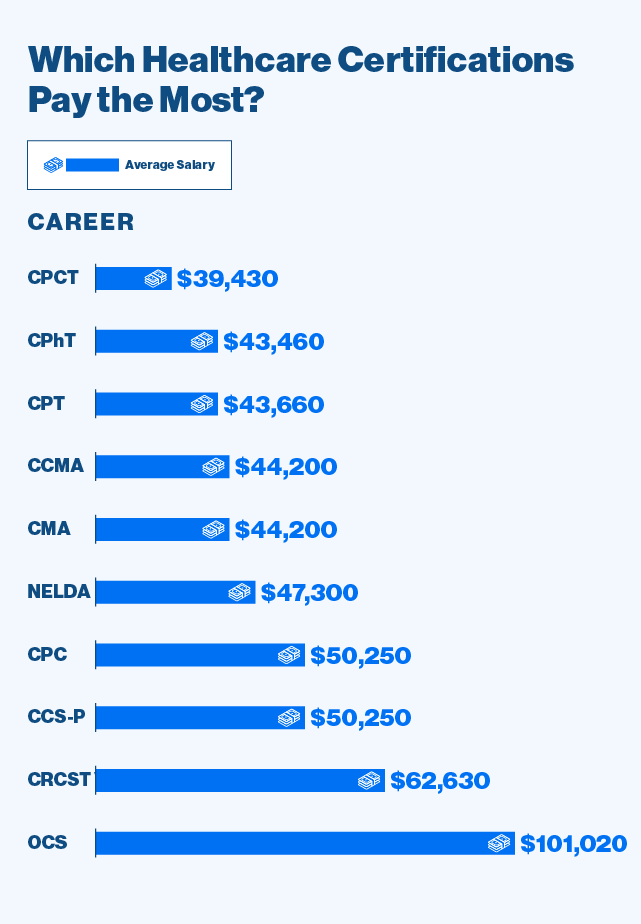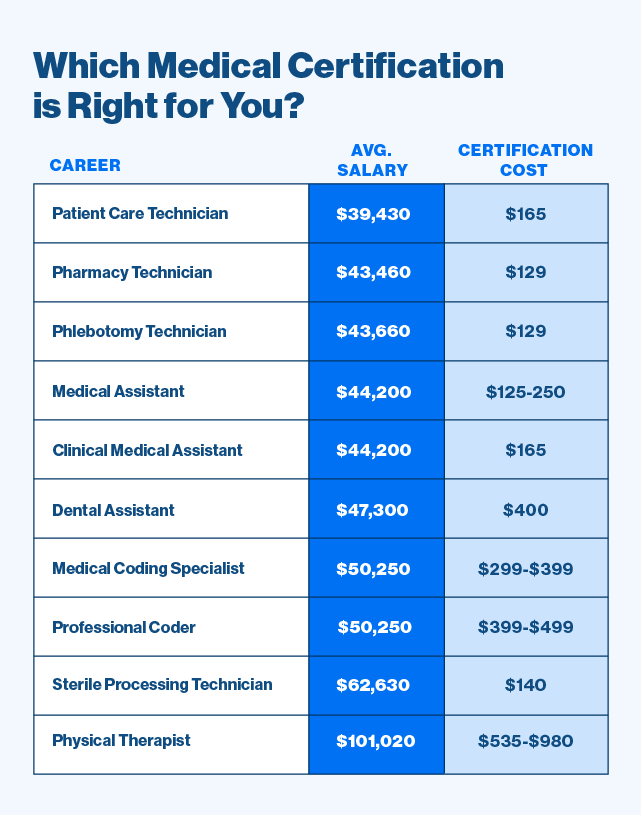
Which Healthcare Certifications Pay the Most? A Guide to Higher-Earning Medical Jobs Through Certification
Aug 14, 2025
10 min read
We follow strict quality and ethics policies to make sure our content is honest, accurate, and helpful. Learn more about our editorial guidelines.
In today's competitive job market, having a specialized skill set and the right certification can significantly affect your earning potential and job stability.
This guide is designed to help you explore the top healthcare certifications that can lead to the highest-paying jobs in the medical and healthcare fields. We will discuss various roles, including patient-facing and non-patient-facing positions.
Top 10 Health Certifications that pay well
The importance of certified healthcare professionals cannot be overstated. These people play a critical role in effectively delivering healthcare services, and ensuring patients receive the highest quality care possible. As the industry continues to evolve and adapt to new technologies and treatments, the need for skilled and certified professionals will only continue to grow.
Whether you're just starting your career journey, seeking a change, or looking to advance in your current healthcare role, obtaining the right certification can open doors to fulfilling and financially rewarding opportunities. So, let's dive in and explore the healthcare certifications that have the potential to land you the highest-paying medical and healthcare jobs.
Read more: 12 Healthcare and Medical Careers In Demand

1. Medical Coding Specialist (CCS-P) 10-14 months*
Certification: Certified Coding Specialist Physician-Based (CCS-P)
Certifying Organization: American Health Information Management Association (AHIMA)
Requirements: Two years of experience in medical coding or courses in anatomy, physiology, pharmacology, medical terminology, and reimbursements, among others.
Program name: Medical Billing and Coding
Certification Cost: $299-$399
Average Salary: $50,250
Should I get training? Recommended
Continuing education: CCS-Ps must complete a specified number of Continuing Education Units (CEUs) every two years to maintain their certification.
Job outlook and growth potential: The job outlook for medical coders is positive, with a growth rate of 9% from 2023 to 2033.
Pros:
- Positive job outlook for medical coders
- Opportunities for remote work
- Opportunities for specialization in various medical fields
Cons:
- Requires continuous learning due to changing medical coding standards
- Can be repetitive and detail-oriented work
Skills and personal attributes: Attention to detail, knowledge of medical terminology, analytical skills, strong communication, and organizational skills.
*Timeframe based on Penn Foster’s Medical Billing and Coding Program.
Read more: Medical Coding Professional vs. Medical Billing and Coding: What’s the Difference?
2. Patient Care Technician (CPCT)
Certification: Certified Patient Care Technician (CPCT)
Certifying Organization: National Healthcareer Association (NHA)
Requirements: High school diploma
Certification Cost: $165
Average Salary: $39,430
Should I get training? Recommended
Continuing education: CPCTs must complete continuing education requirements as mandated by their certifying body and employer.
Pros:
- Opportunity to work in various healthcare settings
- Ability to build strong patient relationships
Cons:
- Physically demanding work
- Emotional stress due to working with patients in distress
Skills and personal attributes: Compassion, strong communication skills, patience, multitasking, and attention to detail.
3. Phlebotomy Technician (CPT) 12 months*
Certification: Certified Phlebotomy Technician (CPT)
Certifying Organization: National Healthcareer Association (NHA)
Requirements: High school diploma or GED/equivalent, completed training or an education program, and completed minimum 30 venipunctures and 10 capillary (finger) sticks
Certification Cost: $129
Average Salary: $43,660
Should I get training? Recommended
Continuing education: CPTs must complete continuing education requirements as mandated by their certifying body and employer.
Job outlook and growth potential: The job outlook for phlebotomy technicians is higher than average, with a growth rate of about 8% from 2023 to 2033.
Pros:
- Positive job outlook for phlebotomy technicians
- Potentially short training period
- Opportunity to work in various healthcare settings
Cons:
- Exposure to blood and other bodily fluids
- Limited career advancement without additional education or certifications
Skills and personal attributes: Excellent hand-eye coordination, attention to detail, strong communication skills, ability to work well under pressure, and empathy.
*Timeframe based on Penn Foster's Phlebotomy Technician Program.
Read more: Jobs in Healthcare Management & Healthcare Administration: Your Career Guide
4. Dental Assistant (NELDA) 3-7 months*
Certification: National Entry Level Dental Assistant
Certifying Organization: Dental Assisting National Board
Requirements: One of four pathways, often including a high school diploma or training program.
Program name: Dental Assistant
Average Salary: $47,300
Certification Cost: $400
Should I get training? Recommended
Continuing education: 6 continuing dental education credits
Job outlook and growth potential: 8% growth through 2033
Pros:
- A growing field
- Opportunity to work closely with patients
- Potential for career growth
Cons:
- Can be physically demanding
- Repetitive tasks
Skills and personal attributes: X-ray operation, instrument handling, sterilization and infection control, communication, patience and empathy.
Read more: How to Become a Dental Assistant (Guide & Salary FAQs)
5. Physical Therapist- Orthopedic Clinical Specialist (OCS) 1-5 months
Certification: Orthopedic Clinical Specialist
Certifying Organization: American Physical Therapy Association (APTA)
Requirements: Current physical therapist with proof of minimum hours of direct patient care.
Certification Cost: $535-$980
Average Salary: $101,020
Should I get training? Yes
Continuing education: Participate in the Maintenance of Specialist Certification (MOSC) process or sit for the certification exam again.
Job outlook and growth potential: 14% growth through 2033.
Pros:
- Potential for high salary
- Close patient interaction
Cons:
- Physically demanding work
- Potential for emotional and psychological stress
Skills and personal attributes: Therapeutic exercise knowledge, manual therapy techniques, patient assessment, active listening, communication, empathy, physical stamina and strength.
*Timeframe based on Penn Foster’s Dental Assistant Program.
Read more: Top Healthcare and Medical Careers for 2025
6. Clinical Medical Assistant (CCMA) 11-16 months*
Certification: Certified Clinical Medical Assistant (CCMA)
Certifying Organization: National Healthcareer Association (NHA)
Requirements: High school diploma and one year of professional experience OR an training/an education program
Certification Cost: $165
Average Salary: $44,200
Should I get training? Recommended
Continuing education: CCMAs must complete continuing education requirements as mandated by their certifying body and employer.
Job outlook and growth potential: The job outlook for medical assistants is higher than any other healthcare role with a growth rate of about 15% from 2023 to 2033.
Pros:
- Positive job outlook for medical assistants
- Opportunity to work in various healthcare settings
- Variety in daily tasks
Cons:
- May involve long hours and be physically demanding
- Limited career advancement without additional education or certifications
Skills and personal attributes: Proficiency in clinical procedures, strong communication, patient care skills, attention to detail, and the ability to multitask in a fast-paced medical setting.
*Timeframe based on Penn Foster’s Medical Assistant Program.
Read more: Your Guide to Medical Assistant Duties
Interested in a Medical Assisting Career?
7. Medical Assistant (CMA) 11-16 months*
Certification: Certified Medical Assistant (CMA)
Certifying Organization: American Association of Medical Assistants (AAMA)
Requirements: Completion of a training program accredited by the Commission on Accreditation of Allied Health Education Programs (CAAHEP) or the Accrediting Bureau of Health Education Schools (ABHES)
Program name: Medical Assistant
Average Certification Cost: $125-250
Average Salary: $44,200
Should I get training? Required
Continuing education: CMAs must recertify every 60 months, either by completing 60 Continuing Education Units (CEUs) or by passing the CMA Certification/Recertification Exam.
Job outlook and growth potential: Projected job growth for medical assistants over the next decade is 15%. There is a demand for certified medical assistants all over the country.
Pros:
- Positive job outlook for medical assistants
- Opportunity to work in various healthcare settings
- Variety in daily tasks
Cons:
- May involve long hours and be physically demanding
- Limited career advancement without additional education or certifications
Skills and personal attributes: Strong communication skills, multitasking, attention to detail, empathy, and ability to work well under pressure.
*Timeframe based on Penn Foster’s Medical Assistant Program.
Read more: Guide to Becoming a Medical Transcriptionist: Salary, FAQs, and Requirements
8. Professional Coder (CPC) 18 months
Certification: Certified Professional Coder (CPC)
Certifying Organization: American Academy of Professional Coders (AAPC)
Requirements: High school diploma, two years of proven job experience as a medical coder, and AAPC membership
Program name: Medical Coding Professional
Certification Cost: $399 for one attempt; $499 for two attempts
Average Salary: $50,250
Should I get training? Recommended
Continuing education: CPCs must complete 36 Continuing Education Units (CEUs) every two years to maintain their certification.
Job outlook and growth potential: The industry is predicting 9% job growth through 2033.
Pros:
- Industry growth for medical coders
- Opportunities for remote work
- Opportunities for specialization in various medical fields
Cons:
- Requires continuous learning due to changing medical coding standards
- Can be repetitive and detail-oriented work
Skills and personal attributes: Diligence, knowledge of medical terminology, analytical skills, strong communication, and organizational skills.
Jaime Nguyen, Director of Healthcare Programs at Penn Foster Group, shares, “The CPC certification is considered the “gold standard” for medical coders. So, a good option for many students is to get the CBCS or CCA certification and then advance to get CPC certification.”
*Timeframe based on Penn Foster’s Medical Coding Professional Program.
Read more: Which Medical Coding & Billing Certification Exam Should You Take? The CBCS or the CPC?
9. Pharmacy Technician (CPhT) 13-17 months*
Certification: Certified Pharmacy Technician (CPhT)
Certifying Organization: Pharmacy Technician Certification Board (PTCB)
Requirements: High school diploma
Program name: Pharmacy Technician Professional
Average Certification Cost: $129
Average Salary: $43,460
Should I get training? Recommended
Continuing education: CPhTs must recertify every two years by completing 20 hours of continuing education, including at least one hour of pharmacy law and one hour of patient safety.
Job outlook and growth potential: Pharmacy technicians are experiencing 7% job growth.
Pros:
- Opportunity to work in various settings, such as retail pharmacies, hospitals, and mail-order pharmacies
- Can gain valuable experience in the healthcare industry and pharmaceuticals
- Relatively short training period compared to other healthcare professions
Cons:
- May involve long hours, including weekends, evenings, and holidays
- Limited career advancement without more education or certifications
Skills and personal attributes: Mindfulness, knowledge of pharmaceuticals and medication dosages, strong communication, adaptability, and organizational skills.
*Timeframe based on Penn Foster’s Pharmacy Technician Program.
Read more: How to Become a Pharmacy Tech
10. Sterile Processing Technician (CRCST) 2-4 months
Certification: Certified Registered Central Service Technician (CRCST)
Certifying Organization: Healthcare Stertile Processing Association
Requirements: 400 hours of hands-on experience
Program name: Sterile Processing Technician
Certification Cost: $140
Average Salary: $62,630
Should I get training? Recommended
Continuing education: 12 CEUs
Job outlook and growth potential: 18% growth through 2033.
Pros:
- Quick entry into the field
- Vital role for patient safety
- Opportunities for growth
Cons:
- Physically demanding
- Repetitive work
- Exposure to contaminated materials
Skills and personal attributes: Sterilization techniques, decontamination procedures, equipment operation, meticulousness, documentation skills.
*Timeframe based on Penn Foster’s Sterile Processing Technician Program.

Earn healthcare certifications to grow your career
The healthcare industry is constantly evolving and expanding with numerous professional growth opportunities. By pursuing advanced certifications, you can enhance your skills and secure a promising future with higher-paying positions. To achieve this, it may be crucial to acquire the necessary training and education. Penn Foster offers various healthcare programs that help prepare its students for many certification exams.
When explaining why online programs can be beneficial, Jamie had this to say: “Online training programs are important options for many students who are looking to enter or to upskill into a healthcare profession. Previously, people who wanted to enroll in healthcare training programs were often limited by location and had few, if any, opportunities to training programs, instructors, and other educational resources. This was especially true in remote or rural areas and for those with limited or no transportation. With almost all households with Internet access, online training programs are now much more accessible to anyone interested in a healthcare career, regardless of location."
To learn more about how a Penn Foster training program can help you reach your career goals, request more information or reach out to our Admissions Specialists at 1-888-427-6500.




